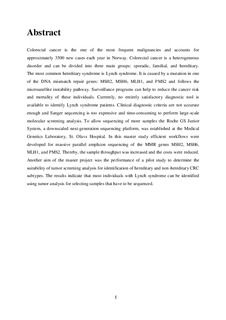Massive parallel amplicon sequencing of the mismatch repair genes MSH2, MSH6, MLH1 and PMS2. Implementation of hereditary and non-hereditary subtypes of colorectal cancer
Master thesis
Permanent lenke
http://hdl.handle.net/11250/263911Utgivelsesdato
2013Metadata
Vis full innførselSamlinger
Sammendrag
Colorectal cancer is the one of the most frequent malignancies and accounts for approximately 3500 new cases each year in Norway. Colorectal cancer is a heterogeneous disorder and can be divided into three main groups: sporadic, familial, and hereditary. The most common hereditary syndrome is Lynch syndrome. It is caused by a mutation in one of the DNA mismatch repair genes: MSH2, MSH6, MLH1, and PMS2 and follows the microsatellite instability pathway. Surveillance programs can help to reduce the cancer risk and mortality of these individuals. Currently, no entirely satisfactory diagnostic tool is available to identify Lynch syndrome patients. Clinical diagnostic criteria are not accurate enough and Sanger sequencing is too expensive and time-consuming to perform large-scale molecular screening analysis. To allow sequencing of more samples the Roche GS Junior System, a downscaled next-generation sequencing platform, was established at the Medical Genetics Laboratory, St. Olavs Hospital. In this master study efficient workflows were developed for massive parallel amplicon sequencing of the MMR genes MSH2, MSH6, MLH1, and PMS2. Thereby, the sample throughput was increased and the costs were reduced. Another aim of the master project was the performance of a pilot study to determine the suitability of tumor screening analysis for identification of hereditary and non-hereditary CRC subtypes. The results indicate that most individuals with Lynch syndrome can be identified using tumor analysis for selecting samples that have to be sequenced.
